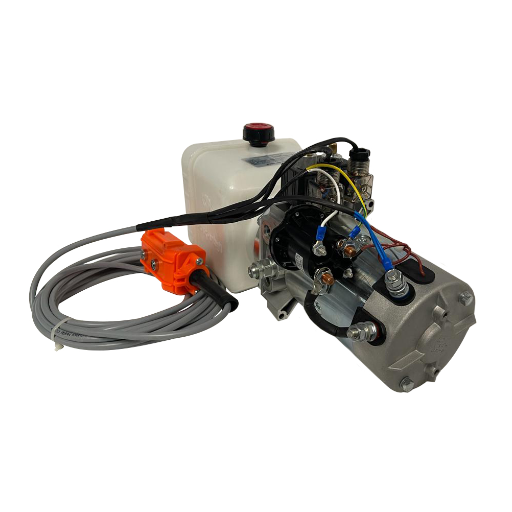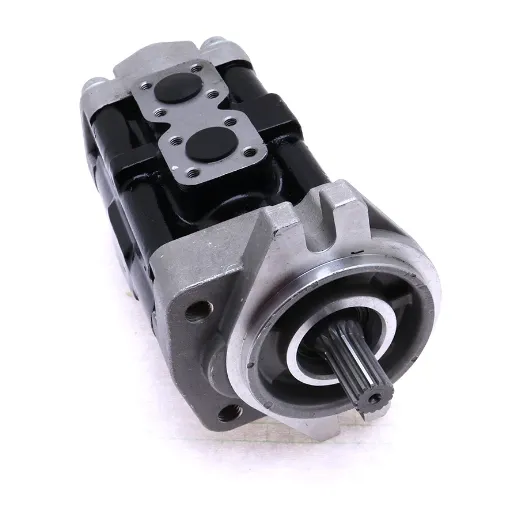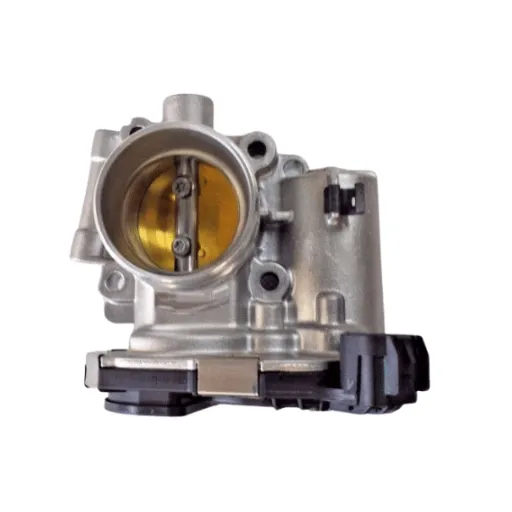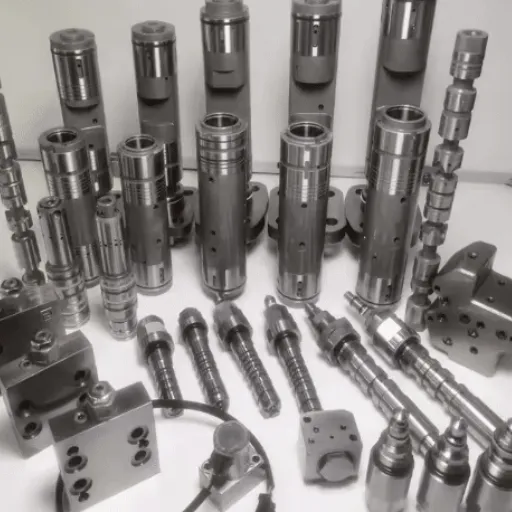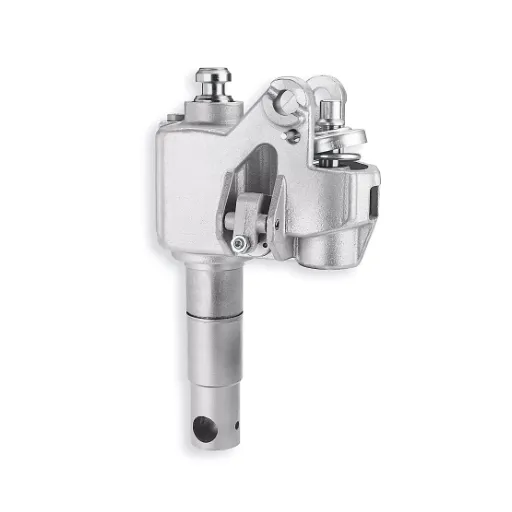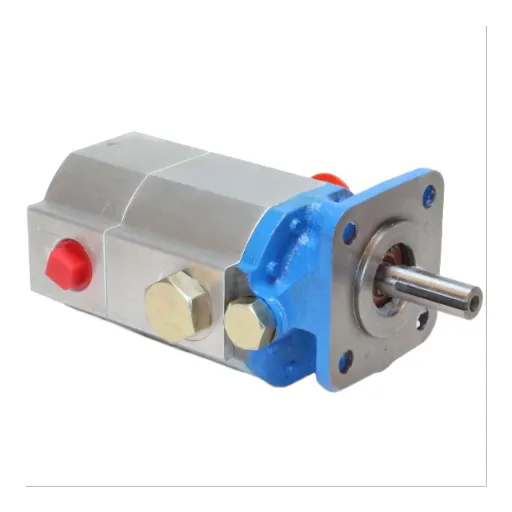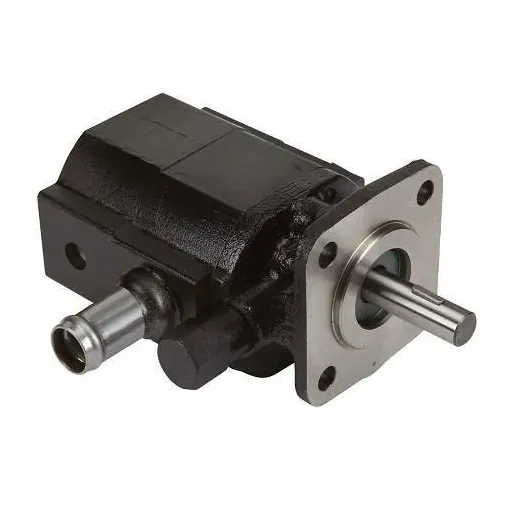When it comes to operating a dump trailer effectively, the hydraulic pump plays a pivotal role in ensuring smooth, reliable, and efficient performance. This critical component is responsible for powering the hydraulic system, enabling the trailer to lift and lower heavy loads with precision. However, not all hydraulic pumps are created equal, and understanding the nuances of their design, capabilities, and power output is essential for anyone looking to optimize their equipment. In this article, we will explore the key aspects of hydraulic pumps for dump trailers, highlight their impact on performance, and provide actionable insights to help you make informed decisions. Whether you’re a professional in the field or new to hydraulic systems, this guide is designed to equip you with the knowledge to elevate your dump trailer’s functionality.
Overview of Hydraulic Pumps for Dump Trailers
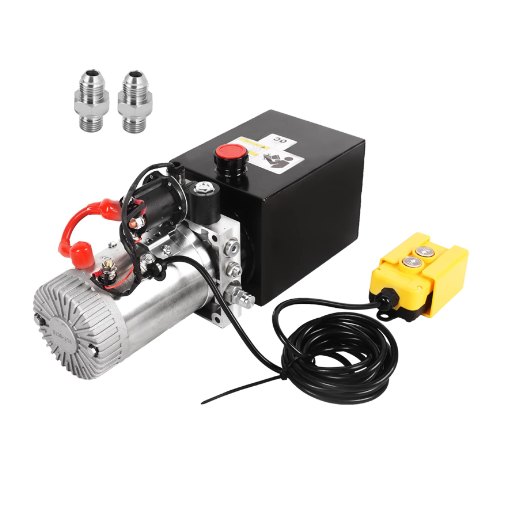
What is a Hydraulic Pump?
A hydraulic pump is a very important component in hydraulic systems, primarily to change mechanical energy into hydraulic energy. Fluid enters the pump through suction and is then fed under pressure into the system. The pressurized fluid works through actuators such as cylinders or motors to lift, press, or move heavy loads, albeit in a controlled and efficient manner.
There are various types of hydraulic pumps commonly used in markets, with gear, vane, and piston pumps standing apart. Gear pumps are low-cost and reliable; hence, they are considered for less critical applications. Vane pumps are good for smooth operation, so they find applications where operational performance consistency is required. Piston pumps, with their high efficiency and pressure ratings, are used for heavy-duty systems such as dump trailers, where precision and force are key.
In dump trailers, hydraulic pumps are the primary operational components for the lifting and lowering systems of the trailer bed. By providing hydraulic power to the cylinder, the pump allows the safe and proper execution of work by the trailer. Selecting and maintaining the pump properly ensures long system life, optimized for performance under all load conditions. Usually, manufacturers specify that the pump should be selected on the basis of type and capacity according to the equipment’s working requirements.
Importance of Hydraulic Power in Dump Trailers
In addition to contributing to the functioning and efficiency of the dump trailer, hydraulic power also serves to lift and lower the trailer bed. This ability allows operators to load and unload materials like gravel, soil, or even waste with absolute ease. Physically lifting and lowering the charges would take a greater level of effort and time, thus lowering productivity and convenience. The force generated by this very system is required in all material handling applications that occur frequently.
With the proper design of the hydraulic pump, one is able to control the dump trailer bed movements fluidly and accurately. This adds to the safety of operations as sudden or unintended shifts are controlled and do not endanger human life or equipment. Beyond this, good hydraulic systems usually have a pressure relief mechanism set in place to protect both the pump and other components from being subjected to stress or overloading, which would guarantee low reliability in the long run.
Furthermore, hydraulic power serves to make the use of dump trailers more cost-efficient. These days, there exist hydraulic systems that are not only energy-efficient but also offer great power output. This means that less fuel is consumed by the vehicle operating the trailer and that there is less wear on mechanical components, which in turn lowers operational and maintenance costs with time. Proper maintenance of the hydraulic system, plus employing a compatible pump designed for a trailer application, are some sure ways of maximizing these benefits.
Key Components of a Hydraulic System
A hydraulic system contains several components deemed essential in transmitting power through the pressurized fluid. These components enable the system to work efficiently and in a reliable manner under different conditions. The following are the main components of a hydraulic system, along with their working functions:
- Hydraulic Pump: The hydraulic pump is one equipment that converts mechanical power into hydraulic energy by transmitting fluid through the system. Different kinds of pumps exist, like gear, vane, or piston types; each is designed for various pressure and flow requirements. Keeping the one proper for the job ensures that excellent performance is attained within the system and energy is used efficiently.
- Hydraulic Fluid: This hydraulic fluid is the medium of power transmission and is also the working material for lubrication, sealing, and heat transfer in the system. Actual selection of hydraulic fluid will depend on viscosity, temperature of operation, and compatibility with materials of construction in the system; otherwise, upon wrong selection, wrong functionality and less longevity could occur.
- Valves: Valves control the flow rate, pressure, and direction of the hydraulic fluid within the system. The prominent valve types are pressure relief, directional control, and flow control. By doing this, they attain exact control of the system, protect it from overpressure, and maintain it within the desired operating parameters.
- Actuators: Actuators, or sometimes called hydraulic cylinders or motors, use hydraulic energy for mechanical movement and force generation in linear motion produced by cylinders and rotary motion for application in hydraulic motors for many different tasks within machinery and equipment.
- Reservoir: The hydraulic reservoir holds the fluid for the system and performs other functions such as heat dissipation, air separation, and contamination settling. Good reservoir design must ensure sufficient fluid capacity and proper temperature control.
- Filters: Filters remove contaminants present in the hydraulic fluid to avoid damage to the system and to maintain operational reliability. Proper filtration caters to the extended life of hydraulic components, reduces maintenance, and ensures good performance.
- Hoses and Fittings: Hoses and fittings offer a strong pathway for the flow of hydraulic fluid from one component of the system to another. The hoses and fittings must be designed to withstand the pressure and temperature involved in the working environment to avoid leakage or incidents.
Proper selection, installation, and maintenance of these components enable the hydraulic system to attain all its potentialities of efficiency, reliability, and durability.
Types of Hydraulic Pumps
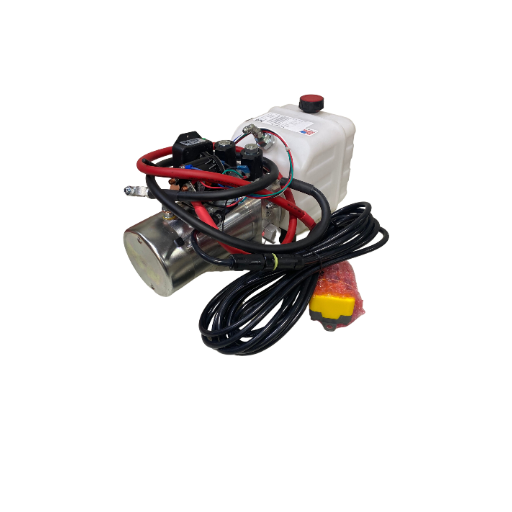
Gear Pumps: Characteristics and Applications
Gear pumps rank among the most prevalent varieties of hydraulic pumps given their straightforward design, reliability, and versatility. They pressurize and move hydraulic fluid within a hydraulic system with the help of the intermeshing of gears. There exist two main types of gear pumps to meet two specific needs: external and internal gear pumps. External gear pumps are created with two identical gears intermeshing and rotating in opposite directions, while internal gear pumps use one external driver gear engaging with an internal gear that rotates concentrically.
The external gear pump is favored for the heavy-duty nature of its design and high-pressure handling capacity that can easily go up to 3000 psi or more. This makes it suitable for industrial applications where steady performance is required under demanding operating conditions. Whereas internal gear pumps find their niche in quieter applications requiring self-priming and that can handle higher viscosity fluids like high-lubricity oils or some chemical fluids.
Efficiency in gear pumps can be affected by many factors, such as the working fluid viscosity, pump speed, or operating pressure. They are, in fact, slightly less energy efficient than some more complex pump types, but in return, their simple and inexpensive design, small footprint, and ease of maintenance make them a good choice when output of moderate to high volumes is to be guaranteed.
Typical applications include agricultural machinery, material handling systems, construction machinery, oil and gas operations, etc. Processing a large variety of fluids further stresses the general adaptability, thanks in part to the mix of fluids these pumps can deal with-waters, glycol mixtures, synthetic oils, and abrasive fluids, to name a few. The critical point to remember when using these pumps: absolute filtration and pressure system monitoring to reduce wear levels and to elongate the service life of these pumps.
An understanding of the specific variables and operational considerations that affect gear pumps enables the engineer/system designer to maximize the overall hydraulic system’s efficiency and service life. Proper selection of application requirements can always guarantee a very reliable operation even under harsh conditions.
Piston Pumps: How They Work and Their Benefits
A piston pump operates based on a reciprocating principle. One or more pistons travel along the axis of the cylinder to generate alternate suction and discharge strokes. This motion temporarily creates a vacuum during the suction stroke to draw fluid and then produces high-pressure conditions in the discharge stroke to eject fluid from the outlet. This principle proves to be highly efficient, as any fluid leakage around the piston is minimal due to the tight seal, thus allowing the pump to handle any high-pressure job with ease.
They serve well when exact flow rates must be maintained regardless of pressure changes; a few such industries include oil and gas, chemical processing industries, and manufacturing. In addition, piston pumps are capable of pumping a wide variety of fluids that range from high-viscosity liquids to abrasive ones and those containing suspended particles.
Furthermore, piston pumps allow superior efficiency with varying displacement controls, giving an operator freedom to vary output volume by the existing demand. This reduces the energy wasted and thus increases the overall system performance. In most cases, the modern piston pumps are manufactured in combination with advanced materials and coatings that improve wear resistance in those pump areas, especially when handling aggressive or abrasive media. Those pumps are also designed for a long service life and maintenance-free operation with very high reliability, guaranteeing performance in critical applications.
With the improvement in design technology and materials engineering, piston pumps still remain at the core of hydraulic and industrial systems, delivering the finest performance in harsh conditions.
Benefits of Using a Hydraulic Pump in Dump Trailers

Improved Efficiency in Dumping Operations
The hydraulic pumps allow for precision control over dump trailer activities, thereby increasing computational efficiency while transferring actuation power. Such systems are hydraulic circuits designed to save energy by minimizing losses as heavy loads are lifted and lowered. Variable displacement pumps allow modern dump trailers to adjust the flow rate and pressure dynamically, depending on the load requirements, to make the best use of energy. Therefore, the adaptive nature of the equipment aids in increasing efficiency and cutting costs over time, giving tangible benefits in real-time environments where performance is paramount.
The integration of new, high-quality materials and electronics into the hydraulic pumps guarantees almost zero lag time during the operation while ensuring top-notch accuracy. For example, load-sensing hydraulic systems can adjust themselves to variable pressure requirements, thereby guaranteeing that the power output is always according to the load force required; this offers smoother operation with less abrupt movement, thus protecting the hydraulic components from undue mechanical stress. Advanced hydraulic actuation control means safer and more reliable operation, especially, use cases comprising many dump cycles on uneven terrain.
Lastly, hydraulic pumps also contribute to efficient dumping by assuring uniform performance under a variety of environmental conditions. Modern pumps are designed bearing in mind temperature changes and contamination possibilities and shall, therefore, remain effective in the working environment. Another feature that lends itself to the strength of the pump in demanding scenarios is an advanced filtration system embedded in the hydraulic circuit, thereby preventing any kind of debris or particulate from getting right under the nose of the pump. This, in turn, helps increase the pump’s service life and allows dump trailer operators to reach high productivity in tough working environments in a timely fashion, safeguarding operational deadlines while keeping equipment reliability intact.
Smoother Operation for Enhanced Control
Smoother working hydraulic systems primarily entail better processing and functions for dump trailers. With advances in pump design, it now entails careful design of components alongside appropriate fluid mechanics. These smooth out pressure fluctuations to ensure that an operator experiences smooth and steady operation while lifting or lowering. In other words, this can afford operators better safety against accidental workloads and structural stress on the equipment.
Hydraulics with smoother motion makes an appreciable difference from my viewpoint when it comes to operational efficiency. Fluid movement of the mechanisms of a trailer translates to fewer system irregularities that cause downtime and less maintenance intervention regarding wear due to erratic hydraulic flow. Better control also means less operator fatigue from repetitive tasks and improves overall productivity in demanding work environments.
The design innovation and right upkeep can, however, guarantee a reliable and sustainable solution for achieving the utmost performance of dump trailers. This would mean very akin to a great improvement in daily performance; for operators, every movement is accomplished with great precision and confidence, at a perfect balance between performance and functionality.
Increased Reliability and Durability
A lot of variate rigorous operating conditions are to be faced by dump trailers since they sometimes handle very heavy loads and are subjected to the challenges of rough terrains and ever-changing weather conditions. To enhance the reliability of these trailers, high-strength steel alloys and newer welding techniques are adopted to further augment structural integrity, thereby making the trailer capable of undergoing constant stress without succumbing to material fatigue or deformation. Corrosion-resistant coatings also serve as a protection against moisture, salty atmospheres, and chemical exposure or a combination of these factors, thereby greatly enhancing the life of the equipment.
Modern hydraulic advancements further contribute to the reliability and durability of dump trailers. Hydraulic cylinders are precision-engineered; fluid reservoirs are large enough for smooth and consistent operation under severe weight conditions. Proper sealing is done to prevent leaks or contamination that can lead to a reduction in service performance as time goes by. These enhancements also use relatively advanced lubricants as well as wear-resistant materials for all moving components to minimize friction, thereby reducing mechanical wear and the frequency of maintenance. In addition to automated control features, these help to safeguard vital parts while ensuring dependable operation even during long-term use.
Also, maintenance procedures ensure reliability and durability. Such preventative measures include periodic inspections and repairs made by manufacturers’ recommended service schedules so that problems are detected and addressed before the incidence of failure. Looking after tire pressures, greasing up the pivot points, and monitoring hydraulic fluid levels will enhance operational efficiency. The combination of these practices with state-of-the-art engineering solutions will give rise to a very reliable and durable system capable of delivering maximum performance in the long run.
Maintenance Tips for Hydraulic Pumps
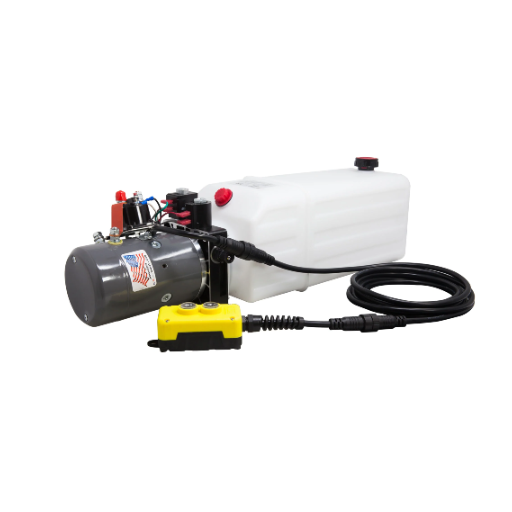
Regular Inspections and Their Importance
Regular inspections are the first step in guaranteeing the reliable operation and efficiency of hydraulic pumps. Systematic evaluations enable operators to spot premature signs of wear, contamination, or inefficiency that could give way to bigger problems or a total system breakdown if not treated in time. The inspection must be comprehensive, examining every component that might be susceptible to leaks, cracks, or damage, such as seals, hoses, and fittings, while closely monitoring factors like the pump operating temperatures and its sound levels to yield crucial information about its performance and possible deviations.
One of the aspects to be considered during periodic inspections is the condition of the fluid. Hydraulic fluid is the life-sustaining force of the system and, consequently, is one of the key factors affecting the pump’s performance. At inspections, operators should discern if discoloration, presence of particulates, foaming, or unpleasant odors are present, any of which would point towards contamination or degradation. A regime of regular sampling and testing for viscosity, water contamination, and solid particles should ensure the fluid stands within manufacturer-specified norms, while tools like infrared thermometers and oil analysis kits will prove invaluable in ensuring real data feeds into preventative measures.
Proactive inspections and maintenance reduce the occurrence of unplanned downtime and costly repairs. Such procedures add to the operational cost efficiency by increasing the lifetime of the hydraulic pump and lessening the frequency at which the pumps are replaced. Executing these inspections alongside digital predictive maintenance tools, such as sensors capable of providing real-time performance data, paves for further superior control at the operational level. Combining conventional inspection protocols with modern technology will allow the operators to enjoy the gains of an efficient operational procedure and long-life durability of their hydraulic system. In that regard, regular inspections, along with data that supports decisions, are fundamental.
Fluid Checks: Ensuring Optimal Performance
Checking the fluid levels is a very important procedure for maintaining operational efficiency and reliability in hydraulic systems. Hydrostatic fluid is the life of the system. It transfers energy, lubricates, and dissipates heat. In the course of time, in these fluids, contaminants such as dirt, water, or metallic particles enter, resulting in their degradation and, to some extent, lowering of the performance of the systems. Regular fluid testing for levels and contamination threshold, and viscosity keeps systems operating to the prescribed limits for minimal downtime and wear.
Further advanced technology has evolved in fluid monitoring for detailed insights through real-time data analysis. Embedded sensors in hydraulic systems allow for real-time measurements of temperature, pressure, and fluid cleanliness, enabling predictive maintenance practices. Early detection of fluid-related abnormalities equips operators to pre-empt potential system failures, thereby mitigating repairs or replacements costing huge sums. Such developments emphasize that fluid checks should be integrated with modern diagnostic tools for an all-encompassing approach to maintenance.
Apart from that, correct fluid management comprises the use of hydraulic fluids of a high grade that meet OEM specifications and timely replacement of fluids as stipulated by the manufacturer or as per the requirement of the system. Another detailed fluid analysis technique, like spectrochemical analysis or particle counting, can render actionable insights regarding the state of the fluid and the general state of the system. Such high-grade and quality level maintenance of the fluids extends not just the life of hydraulic components but also increases system efficiency and energy consumption, and provides environmentally viable means of industrial operation.
Proper Cleaning Methods to Extend Pump Life
Keeping the pump clean and free from contaminants is essential to maximize efficiency and operational life. It is considered good practice to have a strict cleaning regime in place, ensuring that all internal and external parts are cleaned of any kind of debris, corrosion, or residue buildup. Flushing the system periodically with cleaning agents recommended by the manufacturer will serve to prevent sediment or residue build-up, thus averting the loss of performance.
Ultrasonic cleaning serves as an advanced cleaning method to remove contamination from particularly vulnerable components by employing high-frequency sound waves that affect contaminants, not the component itself. Filtration systems, too, must be inspected and have their filters or relevant components replaced as the case may be, to keep up with flow and filtration standards. Employing pressured water washes over external surfaces while properly shielding delicate parts is another worthy cleaning procedure.
As recorded by industrial data, up to 25% less unplanned downtime is experienced by pumps instituting systematic cleaning and maintenance, including a marked improvement in energy efficiency. Operators can combine these best practices with regular inspection programs to proactively reduce wear and tear, mitigate the risk of cavitation, and realize long-term savings from system operations.
Factors to Consider When Purchasing a Hydraulic Pump
Compatibility with Your Dump Trailer
Always matters are considered, while ensuring compatibility of the pumping system with a dump trailer, since any incompatibility will diminish the system h functionality. In order of importance, size the required rated pressure and flow of the hydraulic system. Any hydraulic system with less pressure and flow will perform inefficient lifting operations, whereas an oversized pump will waste energy and put stress on the system. Make sure that the pressure and flow of the hydraulic pump match that of the dump trailer so as to avert any performance constraints and in association with the further prolonged life of the pumps coupled with other hydraulic accessories.
Another great consideration is the size of the hydraulic reservoir and its overall integration with the pump. The reservoir capacity should be sufficiently large to hold the required volume of hydraulic fluid needed by the system without risking the fluid heating up or getting aerated. Further check if the pump mounting arrangement fits well with the trailer chassis dimensions and the existing hardware; this assures a firm installation and rules out any potential issues in alignment, which is critical to ensuring consistent operational reliability.
For complete knowledge of the capability of the pump, consider where you will use its power sources and drive. Most of the hydraulic pumps for dump trailers are driven by the vehicle’s PTO (power take-off) unit or an electric motor of its own. Ensure that your chosen pump can run off your trailer’s available power system, along with considerations on voltage requirements and connection points, so as to be excluded during the installation stage; researching specific model output efficiencies and manufacturer recommendations will help you identify the exact pump for your dump trailer needs. With a thorough technical background and precise measurements to back up performance data, your pump and dump trailer will work hand in hand in demanding applications.
Power Requirements: Matching the Pump to Your Needs
Selecting the correct pump for your dump trailer starts with a thorough understanding of its power requirements and compatibility with the trailer’s existing electrical system. Typical electric hydraulic pumps used with dump trailers operate at certain voltages, usually 12V DC. This means that you must check whether the voltage of the pump corresponds with that of the power source, offsetting any unforeseen inefficiencies or, on the negative side, equipment failure. Similarly, one should ensure that the amperage level matches what the trailer wiring is capable of handling to prevent any unsafe operations. You could easily end up with an underperforming pump or destroyed equipment if you ignore these specifications.
Apart from these voltage and amperage ratings, you must also look at the duty cycle of the pump. The duty cycle, usually expressed in a percentage, denotes the duration that the pump will operate in a specific interval without getting heated up. If the machine begins to operate frequently, such as loading and unloading continuously, a high-duty cycle pump would allow the most operating time without overheating, so it’s better for working under heavy loads. Besides, if you attach thermal protection and overload protection to your power system, it will be a big plus in terms of system reliability.
Moreover, hydraulic fluid volume and pressure considerations matter just a little bit in getting the best out of the process. Ideal pumping requirements must provide enough flow (gpm) to satisfy the trailer’s needs as far as its rated weight capacity, and sufficient psi to safely raise and lower loads. Assessing hydraulic reservoir size versus pump output is also vital in avoiding cavitation and promoting smooth operation.
Cost vs. Durability: Making the Right Investment
The other option will protect your investment, for example, hydraulics: if we purchase hydraulic equipment that is durable, reasonably priced, and offers a higher efficiency level, our businesses will be able to operate in the long run efficiently. Durable parts seldom go for repeat replacements and repair work, downtime, and maintenance rollers for various reasons. For example, the use of higher-grade alloys, better types of seals, and precision-engineered pumps ensures excellent resistance to wear under high-pressure conditions, leading to a longer lifecycle of the system.
While the initial capital expenditure is more when a system is robust, over time, this is overshadowed by reduced failure rates and service intervals of longer duration, leading to a lowering of total cost of ownership (TCO). It was stated in studies on hydraulic system failures in industrial applications that over 70% of them were due to compromised materials and poor maintenance practices, which should instill in us a great desire to go for the very best in quality parts.
Advanced systems also come with technologies such as sensor-aided condition monitoring that help better schedule maintenance activities and drastically bring down the number of unplanned failures. In doing so, putting durability at the forefront when procuring will not only secure the reliability of the system but will also boost the economics of keeping the systems operational through their working life. Hence, a clear-cut decision-making framework has to consider the long-term perspective of cost vis-à-vis the immediate extra cost.
Frequently Asked Questions (FAQ)
Q: What is a hydraulic pump for a dump trailer?
A: A hydraulic pump for a dump trailer is a crucial component that powers the trailer’s hydraulic system, enabling the lifting and dumping of heavy loads efficiently. It converts mechanical energy into hydraulic energy, allowing for smooth operation.
Q: How does a hydraulic pump for a dump trailer work?
A: The hydraulic pump for a dump trailer works by drawing hydraulic fluid from a tank and pressurizing it to move the dump trailer’s hydraulic cylinders. This process allows the trailer to tilt and dump its contents quickly and effectively.
Q: What are the benefits of using a high-performance hydraulic pump for a dump trailer?
A: A high-performance hydraulic pump for a dump trailer ensures faster operation, increased lifting capacity, and improved reliability. It is designed to handle larger loads and operate efficiently under demanding conditions, making it ideal for heavy-duty applications.
Q: What is the importance of the configuration of the hydraulic pump for a dump trailer?
A: The configuration of the hydraulic pump for a dump trailer is important as it determines the pump’s efficiency and compatibility with the trailer’s hydraulic system. A well-configured pump ensures optimal performance and longevity of the system.
Q: Can I upgrade to a double hydraulic pump for a dump trailer?
A: Yes, upgrading to a double hydraulic pump for a dump trailer can enhance lifting power and speed, allowing for faster dumping cycles. This upgrade is especially beneficial for trailers that frequently handle heavy loads.
Q: What role does the solenoid play in a hydraulic pump for a dump trailer?
A: The solenoid in a hydraulic pump for a dump trailer controls the flow of hydraulic fluid to the pump. It acts as an electrical switch, enabling or disabling the hydraulic system, which is vital for the safe operation of the trailer.
Q: How do I maintain my hydraulic pump for a dump trailer?
A: To maintain your hydraulic pump for a dump trailer, regularly check the hydraulic fluid levels, inspect for leaks, and ensure all connections are secure. Periodic cleaning and replacing worn-out components can also enhance the pump’s lifespan and performance.
Q: What should I consider when selecting a hydraulic pump for a dump trailer?
A: When selecting a hydraulic pump for a dump trailer, consider factors such as the pump’s capacity, compatibility with your trailer’s hydraulic system, the required flow rate, and whether you need a fast-acting or robust and efficient design for your specific applications.



